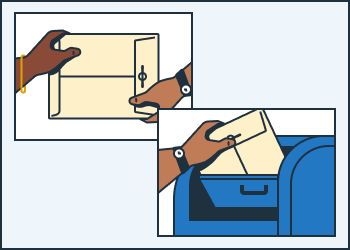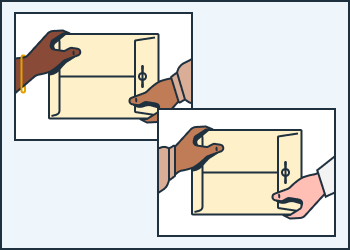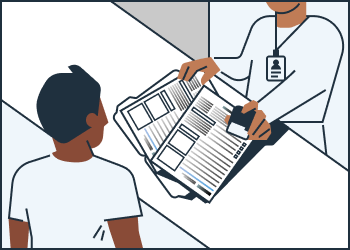Serve your Resposive Declaration
After you file your Responsive Declaration (form FL-320), you must have someone deliver a copy of the papers to your spouse or the other parent. This is called serving papers.
Before you start
Serving means another adult, not you, mails or hands a copy of your Responsive Declaration to your spouse or child´s other parent. This person is your server.
After delivering the papers, your server must sign a form saying they mailed or handed the papers. You file this form with the court.
Choose whether to use personal service or mail service
If your server mails the papers it's called mail service.

If your server hands them the papers it's called personal service.

Unless the court ordered something different, your server can deliver your Responsive Declaration by mail or by personal service.
You can serve by mail only if you can still meet the deadline
📅 Whether you choose mail or personal service you must meet a deadline
- For personal service: You need to file your Responsive Declaration and have it served at least 9 court days before your court date.
- For service by mail: Your server must mail your Responsive Declaration at least 9 court days plus 5 calendar days before the service deadline. If the other side lives far away (like in another county or state), your server must mail it even sooner.
How to serve your Responsive Declaration
↗️ All court form links below open in a new tab.
-
Choose a server
You can't serve papers yourself. Ask another adult – a server – to mail or hand deliver the papers.
Your server must be:
-
18 or over, and
-
Not part of your case
Your server can be someone you know. You can pay someone to serve papers, called a process server.
-
-
📅 Figure out the deadline to serve
Unless the court orders a different time to serve, your server should deliver the papers at least 9 court days before your hearing.
📌 If your server is mailing the papers, they should mail them at least 5 calendar days before the deadline to ensure that the person receives the papers on-time.
How to calculate the deadline
Take out a calendar and find your court date (it’s listed on the first page of the Request for Order).
-
Count backwards from your court date on the calendar 9 court days (Monday to Friday, not including any court holidays or other day the court may be closed).
-
When you get to the 9th day, stop, this is your deadline to serve.
-
-
Have your server mail or deliver the papers
Your server mails or hands these papers to your spouse or the other parent:
-
Copy of your Responsive Declaration and any attachments
-
Any other papers you filed (like an Income and Expense Declaration (form FL-150) (except any fee waivers)
If your spouse or child's other parent has a lawyer, the server you must mail or hand deliver the papers to their lawyer instead.
📬 If serving by mail, tell your server to write down the date they mailed the papers.
- Use regular (first class) mail. Do not use certified mail. It requires getting the other person's signature, which is often hard to do.
🫴 If serving in person, have your server write down the date, time, and address where they handed them the papers. Your server needs this date to fill out the Proof of Service.
-
-
Have your server complete the Proof of Service
- If your server mailed the papers, you can use Proof of Service by Mail (form FL-335)
- If your server personally served, you can use Proof of Personal Service (form FL-330)
It helps if you fill in the top part of the form with the case and court information.
Your server can then fill in the information about how, when, and where they mailed or delivered the papers.
Your server must sign and date the form.
-
Copy and file the Proof of Service

-
Make a copy of your Proof of Service.
-
File the original and copy with the court where you filed the papers. The court will stamp and return the copy.
-
Keep the copy of the Proof of Service for your records.
-
Respond to a Request for Order
What's next?
Once you’ve served your Responsive Declaration, learn about what to expect at your hearing so you know how to prepare.

